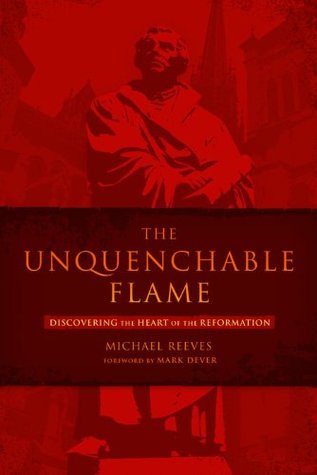More on this book
Community
Kindle Notes & Highlights
Luther literally re-formed Christianity. All the old foundations that once had seemed so solid and certain now crumbled in this storm of change, making way for a new era in which things would be very different.
The Reformation was a revolution, and revolutions not only fight for something, they also fight against something, in this case, the old world of medieval Roman Catholicism.
He had the power to ordain bishops, who in turn could ordain priests; and together, they, the clergy, were the ones with the authority to turn on the taps of grace.
incapable of having an explicit faith.
If they stood under the taps they received the grace.
taste God’s grace.
‘unbloody’ sacrifice
The people would normally only get to eat the bread once a year (and they never got to drink from the cup—after all, what if some ham-fisted peasant spilt the blood of Christ on the floor?),
receive more grace.
And with little understanding of what was being said, it was hard for the average parishioner to distinguish Roman Catholic
orthodoxy from magic and superstition.
This is the effect of the grace that God was said to channel through the sacraments: by making us more and more loving, more and more just, God ‘justifies’ us.
This was what Augustine had meant when he spoke of salvation by grace.
‘God will not deny grace to those who do their best’
She knew from the confession that she was not righteous enough to have merited salvation.
nobody would die righteous enough to have merited salvation fully.
Mary became the mediator through whom people could approach him.
All too often the army of saints was treated as a pantheon of gods, and their relics treated as magical talismans of power.
a statue of the Virgin Mary was hardly capable of teaching the distinction between veneration and worship.
More masses for the dead were paid for, more churches were built, more statues of saints were erected and more pilgrimages were made than ever before. Books of devotion and spirituality—as mixed in content as they are today—were extraordinarily popular among those who could read.
In fact, if all the people had been hungering for the kind of change the Reformation would bring, it would suggest that the Reformation was little more than a natural social movement, a moral clean-up.
The ‘Great Schism’,
With so many competing contenders, how could the ordinary Christian know God’s will?
The rebuilding of St Peter’s, especially, would prove more costly to Rome than a pope’s worst nightmare, for it would rouse the wrath of Martin Luther.
Of course the papacy had had its low points before, but in the midst of the Church’s crisis of authority, it was a bad time for it to lose its respectability.
Wycliffe began publicly to identify the Bible, and not the pope, as the supreme source of spiritual authority.
Fortunately for Wycliffe, he died in 1384 before the Council of Constance condemned him as a heretic (whereupon his remains were exhumed, burned, and scattered);
group Bible reading.
‘Lollards’,
The pope could therefore give a gift of merit (an indulgence) to any soul he deemed worthy, fast-tracking that soul’s path through purgatory, or even leap-frogging purgatory altogether (with a ‘full’, or ‘plenary’ indulgence).
When attempts were made to stamp out Wycliffe’s teachings in Bohemia, Hus defended him and became increasingly outspoken in his critiques of the Church, to the point where he publicly denied the power of popes to issue indulgences and expressed doubts about the existence of purgatory.
The guarantee amounted to nothing, however; he was immediately imprisoned, and after six months in prison and a mock trial in which he refused to recant his views he was summarily condemned to death for heresy in 1415.
Almost exactly a hundred years later, Martin Luther unleashed the doctrine of justification by faith alone on the world.
A main plank of her power was the ‘Donation of Constantine’, which purported to be a fourth-century letter from the Roman Emperor Constantine to the pope, explaining that as he moved his capital from Rome to Constantinople (now Istanbul), he was giving the pope lordship over the western half of the Roman Empire.
Lorenzo Valla
forgery.
Annotations on the New Testament,
Erasmus
And if Rome was not reading the Bible correctly on that verse, what else might she be getting wrong, and what sort of spiritual authority was she? Erasmus’ New Testament was a ticking bomb.
‘Dunce’,
Being given this new attire was a highly symbolic act, for it was said that a man could restore his innocence by becoming a monk so that he became like a baby freshly washed of its sins in baptism.
‘We young monks . . . smacked our lips for joy over such delightful talk about our holy monkery.’
wearing chafing underclothes and freezing in the winter cold were thought to be especially pleasing to God,
How could he, a sinner, address the Judge?
Scala Sancta.
By climbing it, kissing each step and repeating the Lord’s Prayer for each one, he was assured he could free the soul of his choice from purgatory.
The fact that she seemed to have no interest in Christian things suggested something odd was going on.
Allowing Luther such freedom with a Bible was a move Rome would soon profoundly regret,
Holy Roman Empire.
Just the money would do.


